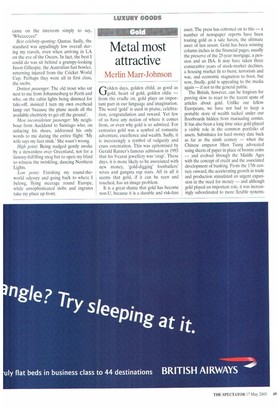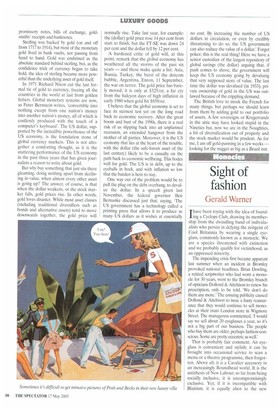Metal most attractive
Merlin Man-Johnson
Golden days, golden child, as good as gold, heart of gold, golden oldie — from the cradle on, gold plays an important part in our language and imagination. The word 'gold' is used in praise, celebration, congratulation and reward. Yet few of us have any notion of where it comes from, or even why gold is so admired. For centuries gold was a symbol of romantic adventure, excellence and wealth. Sadly, it is increasingly a symbol of vulgarity and crass ostentation. This was epitomised by Gerald Ratner's famous admission in 1993 that his 9-carat jewellery was 'crap'. These days, it is more likely to be associated with new money, 'gold-digging' footballers' wives and gangsta rap stars. All in all it seems that gold, if it can be seen and touched, has an image problem.
It is a great shame that gold has become non-U, because it is a durable and risk-free asset. The press has cottoned on to this — a number of newspaper reports have been touting gold as a safe haven, the ultimate asset of last resort. Gold has been winning column inches in the financial pages, usually the preserve of the 25-year mortgage, a pension and an ISA. It may have taken three consecutive years of stock-market declines, a housing market fit to burst, terrorism and war, and economic stagnation to boot, but now, finally, gold is appealing to the media again — if not to the general public.
The British, however, can be forgiven for proving slow to react to the recent spate of articles about gold. Unlike our fellow Europeans, we have not had to keep a portable store of wealth tucked under our floorboards hidden from marauding armies. It has also been a long time since gold played a visible role in the common portfolio of assets. Substitutes for hard money date back as far as the ninth century — when the Chinese emperor Hien Tsung advocated using sheets of paper in place of bronze coins — and evolved through the Middle Ages with the concept of credit and the associated development of banking. From the 17th century onward, the accelerating growth in trade and production stimulated an urgent expansion in the need for money — and although gold played an important role, it was increasingly subordinated to more flexible systems:
promissory notes, bills of exchange, goldsmiths' receipts and banknotes.
Sterling was backed by gold (on and off from 1717 to 1914), but most of the monetary gold lived in bank vaults, not passing from hand to hand. Gold was enshrined as the absolute standard behind sterling, but, as the confidence trick of currency began to take hold, the idea of sterling became more powerful than the underlying asset of gold itself.
In 1971 Richard Nixon cut the last formal tie of gold to currency, freeing all the countries in the world at last from golden fetters. Global monetary systems are now, as Peter Bernstein writes, 'convertible into nothing except from one nation's money into another nation's money, all of which is costlessly produced with the touch of a computer's keyboard'. The US dollar, supported by the incredible powerhouse of the US economy, is the foundation stone of global currency markets. This is not altogether a comforting thought, as it is the stuttering performance of the US economy in the past three years that has given journalists a reason to write about gold.
But why buy something that just sits there gleaming, doing nothing apart from declining in value, when almost every other asset is going up? The answer, of course, is that when the dollar weakens, or the stock market falls, gold prices rise. In other words, gold loves disaster. While most asset classes (including traditional diversifiers such as bonds and alternative assets) tend to move downwards together, the gold price will normally rise. Take last year, for example: the (dollar) gold price rose 14 per cent from start to finish, but the FT-SE was down 24 per cent and the dollar fell by 12 per cent.
A hardened critic of gold will, at this point, remark that the global economy has weathered all the storms of the past six years — and these make quite a list: Asia, Russia, Turkey, the burst of the dotcom bubble, Argentina, Enron, 11 September, the war on terror. The gold price has barely moved; it is only at $325/oz, a far cry from the halcyon days of high inflation in early 1980 when gold hit $850/oz.
I believe that the global economy is set to face its sternest test yet on the long road back to economic recovery. After the great boom and bust of the 1990s, there is a real risk of us slipping back into an unplanned recession, an extended hangover from the mother of all parties. Moreover, it is the US economy that lies at the heart of the trouble, with the dollar (the safe-haven asset of the last century) likely to be a casualty on the path back to economic wellbeing. This bodes well for gold. The US is in debt, up to the eyeballs in hock, and with inflation so low that the burden is here to stay.
One way out of the problem would be to pull the plug on the debt overhang, to devalue the dollar. In a speech given last November, the federal governor Ben Bernanke discussed just that, saying, 'The US government has a technology called a printing press that allows it to produce as many US dollars as it wishes at essentially no cost. By increasing the number of US dollars in circulation, or even by credibly threatening to do so, the US government can also reduce the value of a dollar.' Forget poker; this is the real thing! Here we have a senior custodian of the largest repository of global savings (the dollar) arguing that, if push comes to shove, the government will keep the US economy going by devaluing that very supposed store of value. The last time the dollar was devalued (in 1933), private ownership of gold in the US was outlawed because of the crippling demand.
The British love to mock the French for many things, but perhaps we should learn from them by adding gold to our portfolio of assets. A few sovereigns or Krugerrands in the attic may have looked stupid in the Nineties but, now we are in the Noughties, a bit of diversification out of property and the stock market would be prudent. As for me, I am off gold-panning in a few weeks — looking for the nugget as big as a Brazil nut.



































































































 Previous page
Previous page